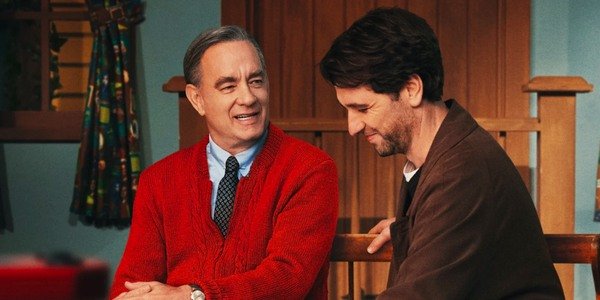Most films, even great films, can’t help but telegraph their punches. And you don’t always have to be watching all that closely to see them coming. Take one of the first scenes in A Beautiful Day in the Neighborhood.
Mr. Rogers (Tom Hanks) is taking a break on set to visit with a Make-A-Wish kid. His crew is mildly annoyed that this very common diversion will mess up their shooting schedule. Viewers, though, are perhaps not surprised to learn that Fred Rogers doesn’t rush anything, ever. That includes moments with the burdened souls who seek his healing presence.
This is no rote, award-season biopic. And the scene with the kid is a brief lesson about how deeply and patiently Mr. Rogers invests in people. It also signals exactly what kind of film A Beautiful Day in the Neighborhood aspires to be.
The film follows an effective cinematic blueprint. It’s a story about a story, about how to write, and sometimes rewrite the story of a life. It’s also a display of impressive acting. Hanks is rightly being suggested for a Supporting Actor nod for this role because it’s not really Mr. Rogers’ neighborhood we’re visiting. At least not entirely. The script is based on a 1998 article by journalist Tom Junod. It chronicles a jaded investigative reporter and the puff profile he does on Rogers.
It’s an assignment journalist Lloyd Vogel (Matthew Rhys) really didn’t want. Still, Lloyd doesn’t lean too hard into the cynicism. He also forgoes the “is this guy for real” exasperation with which someone in his position would have wrestled. But he does expertly tap into things we’ve all felt as adults about Mr. Rogers and his unbreakable saccharin facade. This is where the two actors shine best.
Hanks’ muted consistency and Rhys’ subtle evolution balance the drama in a way that makes the deep connection they forge not just predictable, but also inevitable.
The rest of the cast is also excellent. Chris Cooper, playing Lloyd’s estranged father, has a couple of lines that will knock you flat. Director Marielle Heller (director of Can You Ever Forgive Me) manages the generational shifts of setting and tone with incredible grace. She never lets things rest too long on any one emotional footing.
This is a great film, one of the best of the year, even though you know a few things early on. For instance, viewers immediately gather that the journalist will essentially be a Make-A-Wish grown-up for Fred Rogers to soothe and that Rogers will put in the time to make sure everything’s OK in the end. Still, there are more than enough surprises.
Meanwhile, themes of parenthood, loss and forgiveness are well-served by the notion that genuine, uncomplicated sweetness still has a place in the world.
Or at least it should.






